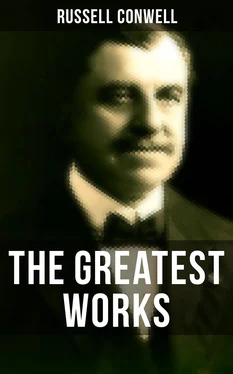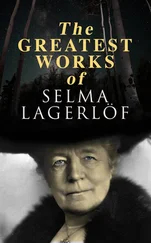Now what is my lesson in that incident? It is this: I told her then, though I did not know her, what I now say to you, "Your wealth is too near to you. You are looking right over it"; and she had to look over it because it was right under her chin.
I have read in the newspaper that a woman never invented anything. Well, that newspaper ought to begin again. Of course, I do not refer to gossip—I refer to machines—and if I did I might better include the men. That newspaper could never appear if women had not invented something. Friends, think. Ye women, think! You say you cannot make a fortune because you are in some laundry, or running a sewing-machine, it may be, or walking before some loom, and yet you can be a millionaire if you will but follow this almost infallible direction.
When you say a woman doesn't invent anything, I ask, Who invented the Jacquard loom that wove every stitch you wear? Mrs. Jacquard. The printer's roller, the printing-press, were invented by farmers' wives. Who invented the cotton-gin of the South that enriched our country so amazingly? Mrs. General Greene invented the cotton-gin and showed the idea to Mr. Whitney, and he, like a man, seized it. Who was it that invented the sewing-machine? If I would go to school to-morrow and ask your children they would say, "Elias Howe."
He was in the Civil War with me, and often in my tent, and I often heard him say that he worked fourteen years to get up that sewing-machine. But his wife made up her mind one day that they would starve to death if there wasn't something or other invented pretty soon, and so in two hours she invented the sewing-machine. Of course he took out the patent in his name. Men always do that. Who was it that invented the mower and the reaper? According to Mr. McCormick's confidential communication, so recently published, it was a West Virginia woman, who, after his father and he had failed altogether in making a reaper and gave it up, took a lot of shears and nailed them together on the edge of a board, with one shaft of each pair loose, and then wired them so that when she pulled the wire one way it closed them, and when she pulled the wire the other way it opened them, and there she had the principle of the mowing-machine. If you look at a mowing-machine, you will see it is nothing but a lot of shears. If a woman can invent a mowing-machine, if a woman can invent a Jacquard loom, if a woman can invent a cotton-gin, if a woman can invent a trolley switch—as she did and made the trolleys possible; if a woman can invent, as Mr. Carnegie said, the great iron squeezers that laid the foundation of all the steel millions of the United States, "we men" can invent anything under the stars! I say that for the encouragement of the men.
Who are the great inventors of the world? Again this lesson comes before us. The great inventor sits next to you, or you are the person yourself. "Oh," but you will say, "I have never invented anything in my life." Neither did the great inventors until they discovered one great secret. Do you think it is a man with a head like a bushel measure or a man like a stroke of lightning? It is neither. The really great man is a plain, straightforward, every-day, common-sense man. You would not dream that he was a great inventor if you did not see something he had actually done. His neighbors do not regard him so great. You never see anything great over your back fence. You say there is no greatness among your neighbors. It is all away off somewhere else. Their greatness is ever so simple, so plain, so earnest, so practical, that the neighbors and friends never recognize it.
True greatness is often unrecognized. That is sure. You do not know anything about the greatest men and women. I went out to write the life of General Garfield, and a neighbor, knowing I was in a hurry, and as there was a great crowd around the front door, took me around to General Garfield's back door and shouted, "Jim! Jim!" And very soon "Jim" came to the door and let me in, and I wrote the biography of one of the grandest men of the nation, and yet he was just the same old "Jim" to his neighbor. If you know a great man in Philadelphia and you should meet him to-morrow, you would say, "How are you, Sam?" or "Good morning, Jim." Of course you would. That is just what you would do.
One of my soldiers in the Civil War had been sentenced to death, and I went up to the White House in Washington—sent there for the first time in my life to see the President. I went into the waiting-room and sat down with a lot of others on the benches, and the secretary asked one after another to tell him what they wanted. After the secretary had been through the line, he went in, and then came back to the door and motioned for me. I went up to that anteroom, and the secretary said: "That is the President's door right over there. Just rap on it and go right in." I never was so taken aback, friends, in all my life, never. The secretary himself made it worse for me, because he had told me how to go in and then went out another door to the left and shut that. There I was, in the hallway by myself before the President of the United States of America's door. I had been on fields of battle, where the shells did sometimes shriek and the bullets did sometimes hit me, but I always wanted to run. I have no sympathy with the old man who says, "I would just as soon march up to the cannon's mouth as eat my dinner." I have no faith in a man who doesn't know enough to be afraid when he is being shot at. I never was so afraid when the shells came around us at Antietam as I was when I went into that room that day; but I finally mustered the courage—I don't know how I ever did—and at arm's-length tapped on the door. The man inside did not help me at all, but yelled out, "Come in and sit down!"
Well, I went in and sat down on the edge of a chair, and wished I were in Europe, and the man at the table did not look up. He was one of the world's greatest men, and was made great by one single rule. Oh, that all the young people of Philadelphia were before me now and I could say just this one thing, and that they would remember it. I would give a lifetime for the effect it would have on our city and on civilization. Abraham Lincoln's principle for greatness can be adopted by nearly all. This was his rule: Whatsoever he had to do at all, he put his whole mind into it and held it all there until that was all done. That makes men great almost anywhere. He stuck to those papers at that table and did not look up at me, and I sat there trembling. Finally, when he had put the string around his papers, he pushed them over to one side and looked over to me, and a smile came over his worn face. He said: "I am a very busy man and have only a few minutes to spare. Now tell me in the fewest words what it is you want." I began to tell him, and mentioned the case, and he said: "I have heard all about it and you do not need to say any more. Mr. Stanton was talking to me only a few days ago about that. You can go to the hotel and rest assured that the President never did sign an order to shoot a boy under twenty years of age, and never will. You can say that to his mother anyhow."
Then he said to me, "How is it going in the field?" I said, "We sometimes get discouraged." And he said: "It is all right. We are going to win out now. We are getting very near the light. No man ought to wish to be President of the United States, and I will be glad when I get through; then Tad and I are going out to Springfield, Illinois. I have bought a farm out there and I don't care if I again earn only twenty-five cents a day. Tad has a mule team, and we are going to plant onions."
Then he asked me, "Were you brought up on a farm?" I said, "Yes; in the Berkshire Hills of Massachusetts." He then threw his leg over the corner of the big chair and said, "I have heard many a time, ever since I was young, that up there in those hills you have to sharpen the noses of the sheep in order to get down to the grass between the rocks." He was so familiar, so everyday, so farmer-like, that I felt right at home with him at once.
Читать дальше












